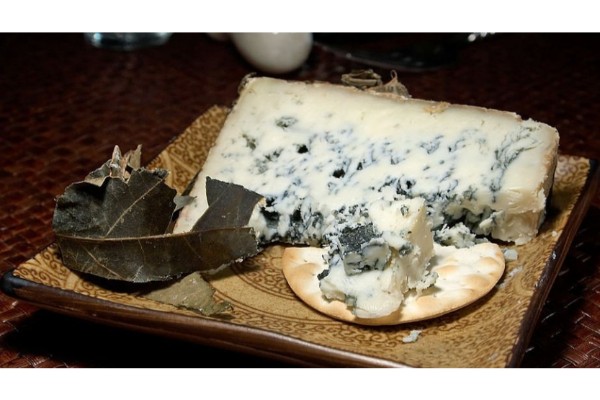No, never give blue cheese to your dog. While cheese is in general not thought to be toxic for dogs, the fungus used to make blue cheeses like Stilton can produce a chemical called roquefortine C that can make dogs extremely sensitive. If your dog ingests this, it may develop the following symptoms:
- Vomiting.
- Diarrhea.
- High temperature.
- Seizures.
Your dog is more likely to exhibit the aforementioned symptoms if they consume more blue cheese. Therefore, always keep blue cheeses like Roquefort, Gorgonzola, and Stilton away from your dog. If your dog eats some by accident, it’s best to consult your veterinarian
Table of Contents
How Do I Respond If My Dog Eats Blue Cheese?

The first thing to note is that there is a chance your dog will be fine if they sneak a tiny bit of blue cheese into their mouth. As you remove the remaining cheese, keep an eye out for any of the aforementioned symptoms to indicate that they may be present. Make a call to your veterinarian if they seem to be getting worse.
It is safe to practice, however, to call your veterinarian as soon as you realize your dog has consumed a significant amount of blue cheese.
They can help you determine which symptoms and signs to pay attention to and whether your dog needs to see a veterinarian.
Can Dogs Eat Other Types Of Cheese?
Dogs can eat cheese in the majority of cases, yes. It can be a fantastic high-reward training treat when used sparingly (especially when there are many distractions). Most dogs also adore the taste of it! It’s crucial to keep in mind that some cheeses contain additional ingredients that should be avoided.
Cottage Cheese
Dogs can consume cottage cheese, yes. This kind is actually one of the better options to give your dog as a treat on occasion because it is low in fat and sodium.
Cream Cheese
In general, dogs can consume a small amount of cream cheese. Although it contains a lot of calories and fat, it is generally fine. Many cream kinds of cheese, however, contain chives, onions, and garlic, which are poisonous to our canines. Avoid using cream cheese of this kind.
Is Cheese Good For Dogs?

In moderation, cheese is beneficial to dogs. Although cheese does contain protein, calcium, vitamin A, essential fatty acids, and B-complex vitamins, your dog already receives these nutrients from their regular, complete diet, so there is no need to include cheese in their diet. However, very small amounts of cheese can be given as a treat.
Is Cheese Bad For Dogs?
Cheese may occasionally be harmful to canines. Some of them are even lactose intolerant, and dairy can upset the stomach. Therefore, do not give cheese to your dog if this is the case. In addition, some cheeses contain things like fruits, nuts, onions, and garlic; always stay away from these. See below for more information on why cheese may be harmful to some dogs.
Never give cheese to overweight dogs or dogs with kidney problems
- Cheese contains a lot of salt, calories, and fat. Instead, choose healthy dog treats to spoil your pet.
Do not give cheese to lactose-intolerant dogs
- Some dogs have difficulty digesting cheese. Although cheese has less lactose than whole milk, dogs with severe lactose intolerance may react poorly to it.
Never give cheese to a dog who has had pancreatitis
- A digestive condition with a high mortality rate is pancreatitis. Dairy products may cause problems because dogs can’t fully digest them. Consistently consult your veterinarian before making a decision.
How To Feed Cheese To Dogs Properly?
You can give cheese to your dog in a few different ways.
One of the most common uses is to obfuscate medication.
To give the tablet to your dog, simply cut up a small cube of cheese (cheddar works best) and insert the tablet into the center of it. Usually, they’ll swallow it whole without a second thought! However, it’s crucial never to attempt to hide antibiotics in cheese as they might bind to the calcium present in dairy products. As a result, the medication may no longer be absorbed by the intestines and become less effective.
As a high-reward training treat, cheese can also be provided.
Once more, cheddar is the best choice for this and needs to be cut into tiny cubes. When teaching more challenging commands, like recall, cheese for dogs works especially well.
Cheese for dogs when they’re bored
If your dog is prone to showing signs of boredom, you might want to add a thin layer of cream cheese to the interior of a Kong toy to keep them occupied. If you’re trying to teach your dog to be left alone, this may be a good option.
You now know the answer to the question, “Can dogs eat cheese?” Want to learn more about what foods your dog can eat and what to avoid? Next, review our article on whether or not dogs can eat blueberries.
When A Dog Can Eat Cheese
- Dogs can eat cheese as long as it is a small amount and they don’t eat it very often
- Dogs with a lactose allergy or intolerance, who need special diets, or are prone to tummy upsets should not eat cheese
- Cheese can make a great high-value treat for training dogs
- Hiding a pill or tablet in cheese can help when your dog doesn’t want to take their medication
- Don’t give your dog blue cheese as the mold that makes the cheese blue can make them very ill
